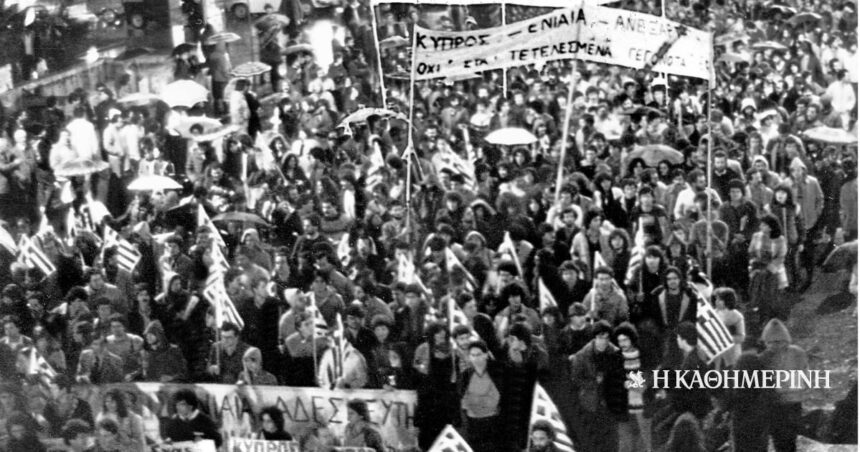The unilateral proclamation of the “Turkish Republic of Northern Cyprus” [«ΤΔΒΚ»] It occurred at a time when UN Secretary-General Javier Peres de Quejar (1982-1991) had inaugurated an attempt to resolve the Cyprus problem through inter-communal dialogue, submitting proposals (“indicators”) on various aspects of the issue. The President of the Republic of Cyprus Spyros Kyprianou then expressed many reservations about the Kuejar proposals. In view of a new impasse in talks, the Turkish side has taken the energy characterized by the political leadership and the Greek Cypriot press.
The bases had been laid a few months after the Turkish invasion as, as early as February 1975, the leadership of the Turkish Cypriots had unilaterally proclaimed a “federal Turkish state”. Occuping further upgrading of the regime, on the night of November 14, 1983, Turkish Cypriot political leader Rauf Denktash announced to Turkish Cypriot “MPs” the decision to proclaim the TRNC. After the members of the House were in favor of the decision, the following morning a resolution was signed, which resulted in the approval of the establishment and independence of the TRNC. The resolution was referred to two peoples, with the right to be self -governed. It was followed by Denktash’s declaration, who emphasized that this action would not prevent the establishment of a “genuine federation”.
First Reactions of Athens – Nicosia
Developments have surprised the government of the Republic of Cyprus. Indicative are reports of the press, according to which the President of Kyprianou appeared “pale and paid” to students and students who rushed to demonstrate, an indication of the surprise and pervasive agony that prevailed even in the ranks of political leadership. However, it was made clear from the outset that there was no reaction by military means, and the reactions observed were two levels: popular and political – diplomatic.
Demonstrations were held on November 15, mainly on behalf of student youth. It was observed, of course, a strong political mobilization. Inside, the House of Representatives met at a special session on November 17, approving a conviction, in which the proclamation of the “TRNC” was interpreted as an action aimed at dichotomy and as a blow “against the whole Cypriot people and the Greek Cypriots”. There was further reference to Turkey’s responsibilities as it was considered that without its encouragement and the presence of 40,000 Turkish soldiers on the island, the Turkish Cypriot leadership would not have done that act.
The EEC member states in a joint statement reaffirmed their support for the independence, sovereignty and territorial integrity of the Republic of Cyprus.
On the international level, from the early hours after Turkish Cypriot action, the President Kyprianou addressed a call for pressure on Turkey to lift the illegality. He had communication with the Greek leadership, the Prime Minister of Britain, the Secretaries -General of the UN and Commonwealth and more. On the same day, in a statement to the European Union of Radio he warned: “If such a situation is allowed, a terrible previous one will be created for the whole world.”
Condemnation resolutions
The convictions of states and organizations were so normal. The dedication of Britain (Guaranteed Power of the State) to legality was secured through a statement by the Ministry of Foreign Affairs on the recognition of “only the Republic of Cyprus”. The approval of convictions on the part of the House and the US Senate was equally raised. It was also considered important to place the EEC member states, which in a joint statement reaffirmed their support for the independence, sovereignty and territorial integrity of the Republic of Cyprus.
In Greece, official condemnation statements by the leadership at the highest level were expressed from the outset. President Konstantinos Karamanlis commented that the Turkish side was promoting partition by violating international law, international treaties and UN decisions. For his part, Prime Minister Andreas Papandreou pointed out that there were risks to peace in the region, stressing that Greece, as a guarantor force, would take all measures and take all the actions necessary to safeguard Cypriot independence and sovereignty.

The Cypriot government looked at the corresponding Greek for active assistance in its diplomatic struggle. In an effort to coordinate, on November 17, separate meetings by the Cypriot President with the Greek Prime Minister and the Greek President. Following the consultations, the Cypriot leadership launched a campaign abroad to ensure the support of international diplomacy. Kyprianou had separate meetings with US President and Foreign Minister Ronald Reagan and George Sultz in late November. At the same time, the Cypriot president also had contacts with the Secretary General. of the UN and with the president of the Movement of the Remembrances, INDIRA Gandhi. GG The UN, in fact, made a statement on which he argued that the Turkish Cypriot action was contrary to the decisions of the Agency’s Security Council, would adversely affect the situation in Cyprus and involved efforts to promote settlement.
The point of reference to developments is the discussion of the issue at the UN Security Council on November 17. Deceit of the discussion was resolution 541 [18 Νοεμβρίου 1983, 13 ψήφοι υπέρ – 1 κατά (Πακιστάν) – 1 αποχή (Ιορδανία)]in which the proclamation of the “TRNC” was described as illegal. At the same time, it was called to all states to respect “sovereignty, independence, territorial integrity and neutrality [non-alignment]”And not to recognize another state on the island by the Republic of Cyprus. The resolution was described by President Kyprianou as “a good starting point” for the efforts to overturn the data. On the other hand, Denktash reacted and commented in a vigorous tone: “What did you expect to do? […] To renounce all of our rights and bow to [στους Ελληνοκυπρίους]; “.
Intra -Greek bonuses and fermentations
A few days after the adoption of this resolution on November 23, the President Kyprianou had the opportunity to address the UN General Assembly. After making it clear that the Cypriot government was not going to accept the situation formed as a situation, he appealed to members to impose the principles of the organization and to stand “despite the side of freedom and justice at this most critical period in the whole story of Cyprus ». In addition, he attempted to use the threat of a “previous” creation, warning representatives of the consequences that the Turkish Cypriot initiative could have created in their own states.
It is worth noting that during this period Athens -Nicosia relations appeared to be shaken. The reason was the attempt to consultation between the three guarantor forces in London, on a British initiative. The Greek prime minister considered the Cypriot government’s exhortation for Greece’s involvement in contradictory consultations with the declared position that the country would not negotiate with Turkey unless the occupation troops left. In view of the discipline, President Karamanlis intervened by calling on the Cypriot president to go to Athens for a meeting with the Greek Prime Minister in order to resolve the issue. The meeting of the three men took place on November 30th. It was finally clarified that it was a disagreement due to the wrong reimbursement of Cypriot statements, who argued that bilateral consultations could be held with Britain, which would consult with Turkey. The Cypriot president then expressed his gratitude to the Greek government for the effort he made to mobilize international public opinion.
Opportunity to achieve unanimity
The proclamation of the pseudo -state has sparked a variety of reactions within the Greek Cypriot community. It is noteworthy that, despite the surrounding atmosphere it could predict, the proclamation of the “state” worked unexpectedly and caused embarrassment. The climate is clearly reflected in a comment by November 16: “Thunderbolt in the air was the proclamation of an independent state in the occupied territories. It was something we were all scared, but that, at least for the time being, we didn’t expect. ” As a result, accusations were expressed by a portion of the Greek Cypriot press and organized bodies for the toniality of the Cypriot government and its inability to prevent (but also predict) developments.

In addition, however, developments have been treated as an opportunity to achieve homosexuality at home to nationwide, as well as to redefine the nature of the Cyprus problem. At the same time, at the level of political leadership and society, the belief that despite the gravity of the UN resolutions were consolidated, it was demanded by a more meaningful political action to resolve the national issue. However, the conviction of the international community was taken as a reassessment of the legal status of the Republic of Cyprus and as an opportunity for international isolation of Turkey.
At the level of political leadership and society, the belief that despite the gravity of the UN resolutions were consolidated, it was demanded by a more meaningful political action to resolve the national issue.
Finally, it is worth pointing out the Cypriot government’s attempt to promote the ongoing occupation and, by extension, the new challenge as a violation of the rights of all people, including Turkish Cypriots. In this context, the relevant resolution of the House of Representatives was of an indirect response to the reports of the Turkish Cypriot “Parliament” resolution about two peoples, from the equal rights of which the need for neighboring coexistence in two states went. By condemning the proclamation of the “TRNC”, the resolution of the Cypriot Parliament concluded “stigmatizing this act as an invasive action […] and a blow to the interests of the entire Cypriot people, Greek Cypriots and Turkish Cypriots. “
*Mr. Michalis Stavris is a Doctor of History of the University of Cyprus.
*Curated by: Evanthis Hatzivasiliou







